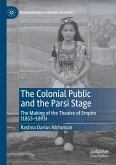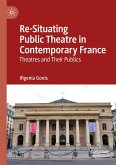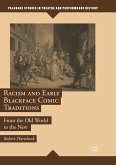The French colony of Saint-Domingue (now Haiti) was home to one of the richest public theatre traditions of the colonial-era Caribbean. This book examines the relationship between public theatre and the enslaved people of Saint-Domingue-something that is generally given short shrift owing to a perceived lack of documentation. Here, a range of materials and methodologies are used to explore pressing questions including the 'mitigated spectatorship' of the enslaved, portrayals of enslaved people in French and Creole repertoire, the contributions of enslaved people to theatre-making, and shifting attitudes during the revolutionary era. The book demonstrates that slavery was no mere backdrop to this portion of theatre history but an integral part of its story. It also helps recover the hidden experiences of some of the enslaved individuals who became entangled in that story.
Joint winner of the The Literary Encyclopedia book prize 2024, category 'Literatures written inlanguages other than English'.
Joint winner of the The Literary Encyclopedia book prize 2024, category 'Literatures written inlanguages other than English'.
"Prest has written the definitive book on the colonial theater of Saint-Domingue and she has reinserted the island's most marginalized group into a dynamic and impressive cultural scene." (Logan J. Connors, The French Review, Vol. 97 (3), March, 2024)
"The book not only shines a light on the mere existence of this theater, but also on the fact that 'enslaved people-mostly enslaved urban domestics-were an integral part of the story of public theatre in Saint-Domingue and not merely a part of the uncomfortable backdrop against which that story unfolded' ... . This fragment of an existence, told in passing, blooms into a rich and complex story, a painstakingly researched and detailed monograph." (Jennifer E. Row, H-France Forum, Vol. 19 (5), 2024)
"Public Theatre and the Enslaved People of Colonial Saint-Domingue makes this case convincingly and provides a grounding for further study that rigorously takes into account the significance of people of color in the making and viewing of theater in Saint-Domingue." (Olivia Sabee, H-France Forum, Vol. 19 (5), 2024)
"The author's concluding sentence explicitly invites future research, which her book will surely inspire ... . In this groundbreaking book, Prest has discovered unknown content, expanded knowledge of understudied sources, and made innovative meaning from established material, ultimately expanding French and francophone studies in important new directions." (Ashley M. Williard, H-France Forum, Vol. 19 (5), 2024)
"The book not only shines a light on the mere existence of this theater, but also on the fact that 'enslaved people-mostly enslaved urban domestics-were an integral part of the story of public theatre in Saint-Domingue and not merely a part of the uncomfortable backdrop against which that story unfolded' ... . This fragment of an existence, told in passing, blooms into a rich and complex story, a painstakingly researched and detailed monograph." (Jennifer E. Row, H-France Forum, Vol. 19 (5), 2024)
"Public Theatre and the Enslaved People of Colonial Saint-Domingue makes this case convincingly and provides a grounding for further study that rigorously takes into account the significance of people of color in the making and viewing of theater in Saint-Domingue." (Olivia Sabee, H-France Forum, Vol. 19 (5), 2024)
"The author's concluding sentence explicitly invites future research, which her book will surely inspire ... . In this groundbreaking book, Prest has discovered unknown content, expanded knowledge of understudied sources, and made innovative meaning from established material, ultimately expanding French and francophone studies in important new directions." (Ashley M. Williard, H-France Forum, Vol. 19 (5), 2024)








